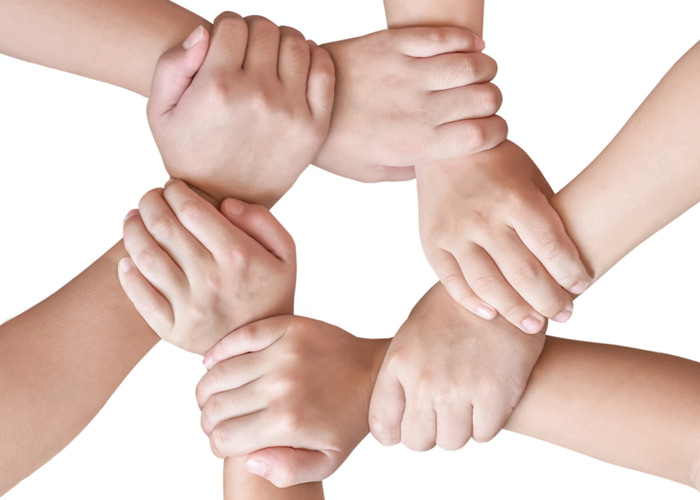What is National Integration
Integration does not mean that there are no differences on any issue. Despite the differences, all accept what is in the larger interest of the nation. This national integration makes all citizens imbued with patriotism. They first consider themselves citizens of India, and next Hindus, Muslim or others. Notwithstanding differences in opinions and beliefs, all the people of a nation are full of mutual love, integration and brotherhood. National integration, thus, is a sentiment which reflects solidarity or patriotism among the people belonging to a nation. It fosters a common identity amongst the citizens of a country making them feel that they are all one.
National integration makes the nation strong and organized. It holds the people of various religions, sects, races, dress, civilization and culture together. Despite several differences, all the people remain in mutual harmony with each other.
India is a shining example of national integration. Very few countries have the kind of diversity that we have in our country. Here people of various castes and communities, whose lifestyle, cultures, languages and customs are completely different, live together. All are bound by the thread of national integration.
National Integration Vs Disintegration
Integration ensures that there is long term peace in a country. It is the quintessential power of an organization or society. Without organization, the welfare of society is not possible, and without integration, the society cannot establish an ideal. While integration is the unifying power for a society or country; the disintegration is a destructive power.
Disintegration breaks society whereas integration connects people on emotional plane. While integration takes society and the country to the peak of society; mutual disharmony leads to the destruction of society. A thread, if pieced together, can bind even a stubborn and powerful animal. But if the strands of a thread remain separate, they are unable to bind even a straw. In other words, we can say 5 organized people are better than 500 disorganized persons.
It is always good to be a part of an organization, irrespective of the domain. Organization is a symbol of progress. Similarly, the house where integration prevails is always full of peace and happiness. Even if a person is poor, but if all are together in his family or organization, he can never be unhappy, but where there is disintegration, i.e., no integration, that home suffers, no matter how much money, wealth it has accumulated.
India: Deep-rooted Integration
Our country is a land of different cultures and has a distinct identity all over the world. Despite linguistic, cultural, and regional diversity, Indians have managed to keep the national integration and integrity intact.
India is a confluence of different cultures, religions and communities. It grants equal status to all religions and sects. Despite diversity, there is integration in them. This is the reason why a sense of integration is reflected in them since centuries. We have always had a liberal approach. We respect truth and non-violence.
India’s multi-coloured and multi-layered ethos is rooted in its ethnic, cultural and religious diversity. No other country in the world offers such an awesome, creative burst of cultures and religions, races and tongues. India is the second largest country in Asia and the seventh largest and second most populous country on Earth.
A thriving civilization since 2500 BC, India represents an amazing confluence of different creeds, religions, faiths and belief systems. All the major religions of the world – Hinduism, Sikhism, Buddhism, Jainism, Islam and Christianity including their sects – are found and practised in India with full freedom. India adheres to and cherishes the ideal of Sarva Dharma Samabhava (equal respect for all belief systems) founded in the ancient past. This has allowed not just tolerance towards religions and beliefs, but the freedom to propound one’s ideas and philosophies.
Hinduism per se is not a homogeneous religion and consists of a multiplicity of creeds and faiths, which are further divided among many castes, sects and sub-sects.
The pluralistic society has; therefore, allowed different faiths and religion get enriched with the unique experience that India offers. It has not only resulted in the creation of great centres of learning about different faiths and religions, but also legends, holy men, holy shrines and pilgrimages. They are not just confined to a region or state but are spread across the country, offering India the unique distinction of being the pilgrimage for the followers of almost all major religions of the world.
Significance of National Integration
Nations are built on the strength of integration. Without integration in each section of its population, the country cannot make any progress. There is great power in integration. Even a stronger enemy can be defeated on the strength of integration.
The divided people and fragmented society break apart. There is no advancement, but only decay and degeneration in disintegration. The society which is organized, tied in integration, can never be defeated because integration is the greatest strength but where there is break-up that society will be subject to destruction by anyone’s onslaught. A small organized society is better than a very large disintegrated society. If we want to create an ideal society, we need to march ahead on the path of integration.
Integration begins at home
Prior to the discussion on national integration, there is need for the integration in family. Until there is integration at home, it is not possible to have integration in the society, the nation, and the world. Only integration can make the society develop. Integration is born out of the sense of organization in a society that leads to lasting peace and joy.
As long as the integration in homes or society is strong, the nation too remains strong. External powers in these circumstances, cannot impact the integrity and sovereignty. But whenever the national integration is fractured, the nation has to deal with a crisis. If we turn the pages of our own history, we see that whenever our national integration has got weakened, each time external forces have taken advantage of it and we had to live under them.
Need of National Integration in India
National integration is essential for any nation. In a heterogeneous country like India, it acts as a cementing factor. Over the years, Pakistan has been trying to weaken national integration by creating Hindu-Muslim differences and inciting anti-India feeling and insurgency in Kashmir. By these divisive politics, the British ruled India for hundreds of years. But when the people of India displayed “Indianness” by forgetting all their differences, the British had to go back from India.
National unity and integration is absolutely necessary for the stability of democracy, defence of freedom and all-round development of the nation. Until the whole nation is bound in a spirit of unity, there would not be any development or economic progress in the country. Therefore, it is the duty of every citizen to promote nationalism to reinforce national integration. We require a strong nation to protect national integration. So, we should suppress disruptive elements by staying away from petty thinking centering on caste, regionalism, religion, etc.
Challenges to National Integration in India
In the ancient times, Indian culture used to easily assimilate other cultures, but now this trait has diminished to a great extent. As a result, residents of a state are sometimes not able to show tolerance for the customs, traditions and languages of the people of other states. Along with narrowness of culture, there has been so many rises in disruptive forces that national unity has become a complex problem in the country.
To solve this problem, we need to remove all the obstacles in the way of national unity and integration. Following are the challenges to national integration in India –
- Casteism – Casteism is a major obstacle in the path of national integration. Great differences are found in inhabitants belonging to different religions and castes in India. Followers of one caste or religion consider themselves superior to those believing in other religions or castes. These tendencies sometimes turn so ugly and narrow that one is unable to adopt a broader view of national interest.
- Communalism – It is a great obstacle in the way of national unity. In our country, there are followers of various religions: Hinduism, Islam, Christianity, etc. Though, generally all the citizens live in a spirit of harmony with one another, many times vested interests create feelings of mutual enmity and hatred, leading to communal clashes. We need to curb communal tendencies to keep national integration intact.
- Provincialism – Provincialism is also a major obstacle in the path of India’s national unity.| On the one hand, there is an increasing tendencies for creation of new states on the basis of language, on the other hand, each state wants to have a controlling stake at the Centre. The narrow sense of provincialism in different states of the country is increasing mutual animosity between states.
- Political parties – In democracy, it is necessary to have political parties for the creation of public opinion and political consciousness. That’s why after independence, various parties were created in our country. Unfortunately, there are many parties which seek votes on the basis of caste, religion, creed and region ignoring public and national interest. In a way, they are engaged in the work of national disintegration.
- Linguistic differences – In a vast country like India, there is need for a national language which is spoken and understood in all regions. But due to narrow regional considerations, Hindi or any other language is yet to be embraced as means of communication by all peoples of the country. The politics over linguistic identity is also not allowing people to rise above their partisan differences over language.
- Economic disparity – Great social as well as economic diversity is found in our country. Only a handful of people in the country are rich while the majority are poor. To earn livelihood remains a great problem for the poor, in solving which they are so busy all the time that they cannot think about the national integration. In the view of this, the economic disparity is a great obstacle in the way of national unity and integration.
Conclusion:
For a developing country like India, which for years has been a victim of slavery, it is a must to strengthen national integration to avoid threats such as communalism, casteism, and regionalism. These separatist tendencies undermine national integration, leading to bloodshed, carnage and riots, etc.
In addition to external elements, external forces too become deterrent to the national integration. The countries who jealous of the freedom and progress the country, always strive to divide and dismember the country. The insurgency in Kashmir has been sponsored and supported by such outside forces. The prolonged turmoil in Kashmir and the north-east India has led to separation of these region’s misguided youths from the national mainstream.
When the number of these disruptive elements tends to be higher, they strive for complete separation. India is a land of vast geographical diversity of the country where several religions, castes, tribes and sects live. These differences which are the pride of our culture, when distorted by vested interests, become an impediment to national unity and integration.
To maintain national integration, it is necessary to pay particular attention to elements of national integration: Indian Constitution, national symbols, national festivals, national anthem and social equity. We need to remember the tales of those great patriots laid down their lives to maintain the national freedom and sovereignty. Following the path and ideals of great patriots promotes national integration.
Related Information:


